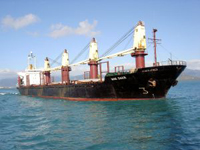UN Body to Finalize Action on Ship Emissions
 Curbing greenhouse gas emissions from ships, possibly by including the sector for the first time in an emissions trading scheme, topped the agenda at a meeting of the industry’s top regulatory body in London this week.
Curbing greenhouse gas emissions from ships, possibly by including the sector for the first time in an emissions trading scheme, topped the agenda at a meeting of the industry’s top regulatory body in London this week. The week-long U.N. International Maritime Organization (IMO) meeting decided how best to reduce CO2 gases, either by imposing a fuel tax, or using more complex market-based instruments like emissions trading.
"The big issue this week is with these so-called market-based instruments and whether shipping is included in an emissions trading scheme at a global level," said Simon Bennett, secretary at the International Chamber of Shipping.
The IMO decided also to tighten restrictions on vessel air emissions in ports and areas close to shore. Under the new rules, ships will have to burn low-sulfur fuels or adopt technology to remove toxic chemicals from their exhaust within clean zones dictated by each nation. The Environmental Protection Agency quickly moved to implement tighter regulations along the shores of the United States. Nearly 90 percent of ships that call on U.S. ports belong to another country.
Shipping contributed about 3.5 percent of global CO2 emissions in 2007, more than previously thought, a scientific report commissioned for the IMO earlier this year found. That compared with about 2 percent from aviation in 2005. But it is climbing as global seaborne trade expands.
These findings are consistent with those of a report issued this week by The Environmental Defense Fund entitled "Floating Smokestacks: A Call for Action to Clean Up Shipping Pollution", which finds that large ocean-going ships in U.S. waters are one of the world’s largest emitters of global warming gases, responsible for about 3 percent of global CO2 emissions. The report also recommends protective policy actions.
The Environmental Defense Fund report analyzed the latest available data from the EPA (2001) and found that large ocean-going ships in the United States emitted:
- 1. About 54,000 tons of particulate matter (PM 2.5), equivalent to the emissions from about 117 coal-fired power plants.
- 2. Approximately 745,000 tons of smog-forming nitrogen oxides (NOx), equivalent to the NOx emissions from 94 coal-fired power plants.
- 3. Nearly 40 percent of all sulfur dioxide emitted by the transportation sector.
The report says that ocean-going vessels are currently subject to weak international emissions standards, and offered the following recommendations:
- 1. Establishing protective limits on pollution around America’s coasts through cleaner fuel standards.
- 2. Addressing global warming pollution from ships.
- 3. Taking actions to reduce or eliminate emissions from ships that are near or in ports by cutting idling emissions when these big ships are at dock.
Since the IMO adopted its first suggestion this week, the Environmental Defense Fund praised the maritime organization for adopting new emission standards. The IMO hopes the action plans agreed on will be enough to prevent the U.N. from imposing its own emission rules at a Climate Change Conference in December 2009.
Concerns have been expressed by the shipping industry about proposals to fold the industry into the European emissions trading scheme as a means to reduce ship borne emissions. Recent research has suggested that emissions trading alone will not do enough to curb the level of emissions from either ocean going vessels or from civil aviation.
Both sectors are excluded from national measures of CO2 emissions under the Kyoto Protocol on warming – the only emissions excluded from inventories under the treaty which critics say leaves them in a policy blind spot.
Billed as one of the most critical issues facing the shipping sector in years, insiders say it is the last chance for the industry to tackle warming gases. The industry has been criticized for dragging its feet over emissions.
Bennett said world shipping, which carries 90 percent of the world’s traded goods by volume, was trying to avoid having regional standards imposed on it which it says would damage it.
"It has to be done within the context of IMO," he said. Bennett said the European Commission, the European Parliament and regulatory bodies in the United States have been happy to give the IMO room to come up with a solution by the end of 2009.
"But the industry through IMO must now deliver or they will impose their own regional standards."
For More Information: WBCSD
You can return to the main Market News page, or press the Back button on your browser.

